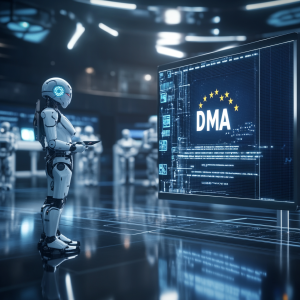The European Union has made a bold move in its ongoing quest to tame the wild west of the digital economy. With the introduction of the Digital Markets Act (DMA), regulators are no longer content to simply react to anti-competitive behavior from tech giants—they’re getting ahead of the game. The DMA is designed to create a fairer, more transparent digital landscape, where innovation can flourish and consumers are empowered. In a world where five or six massive companies dictate how we interact online, this regulation is more than timely—it’s necessary. For AI developers, legal professionals, and anyone riding the wave of digital transformation, understanding the DMA is not just useful, it’s essential.
The Birth of the DMA: Why It Was Needed
The journey toward the DMA started with a growing recognition that the digital market was broken. Over the past two decades, the tech industry has evolved at breakneck speed, but legal frameworks lagged far behind. While traditional EU competition law, such as Articles 101 and 102 of the Treaty on the Functioning of the European Union (TFEU), offered some tools for tackling monopolistic behavior, these provisions were fundamentally reactive. Cases took years to investigate and even longer to enforce—by which time, the damage to the market was often irreversible.
High-profile cases involving companies like Google and Apple highlighted the limitations of existing legal mechanisms. Fines were imposed, appeals were filed, and the practices in question often continued with slight modifications. The system simply wasn’t equipped to handle the digital world’s pace and complexity. The European Commission realized that it needed a new toolkit—one that would allow regulators to intervene before markets were distorted, not after. Thus, in December 2020, the Digital Markets Act was proposed as part of a broader Digital Services Package, alongside the Digital Services Act (DSA). The aim was to create an ex-ante regulatory framework that would impose clear obligations on dominant platforms before they could engage in harmful practices.
After months of negotiations, public consultations, and digital diplomacy, the DMA was formally adopted in September 2022. It entered into force on November 1, 2022, and became applicable on May 2, 2023. The timeline may seem long, but in EU legislative terms, it was lightning fast—a testament to the urgency policymakers felt.

Where and When Does the DMA Apply?
The DMA is not just another niche regulation buried in the EU’s legal labyrinth—it’s a broad, impactful piece of legislation with far-reaching consequences.
Geographic Scope
The DMA applies across the entire European Union. However, due to the global nature of the tech giants it targets, its impact is felt far beyond European borders. Companies like Google, Amazon, and Apple don’t operate region-specific platforms—they use unified global infrastructures. Therefore, any adjustments made to comply with the DMA often influence their operations worldwide. In this sense, the EU is once again playing its favorite role: global standard-setter.
Who Must Comply?
The Act targets so-called „gatekeepers„—companies that control access to digital markets. The criteria for being labeled a gatekeeper are laid out with surgical precision:
- Size Matters: The company must have a strong economic position and significant impact on the internal market.
- Control Points: It must operate a core platform service that acts as a key gateway for business users to reach end users.
- Staying Power: It must have an entrenched and durable position in the market, or be on the path to attaining one.
Gatekeepers aren’t named directly in the legislation, but based on the criteria, several companies have been designated as such by the European Commission—Alphabet (Google), Apple, Amazon, Meta (Facebook), Microsoft, and ByteDance (TikTok’s parent company) are among them.
Core Platform Services
The DMA applies to a specific set of „core platform services,“ including:
- Online search engines
- App stores
- Operating systems
- Cloud computing services
- Social networks
- Online advertising services
- Browsers
- Virtual assistants
- Messaging services
If a company controls one or more of these services and meets the gatekeeper criteria, it falls within the DMA’s scope. It’s important to note that the law is dynamic—new services and gatekeepers can be added as markets evolve.
Why the DMA Matters: Leveling the Digital Playing Field
Let’s be honest: the digital economy has not been a level playing field for a long time. For years, tech behemoths have operated with near impunity, leveraging their platforms to promote their own products, lock in users, and absorb or crush competitors. The DMA is designed to change that.
A Shift from Reactive to Proactive Regulation
Traditional competition enforcement works on a case-by-case basis. It requires proving abuse of dominance, which is a high legal threshold. Investigations can take years, and by the time regulators act, the damage is often done. The DMA changes this by introducing a set of upfront obligations and prohibitions for gatekeepers. It’s like giving referees a rulebook before the game starts, instead of letting players invent the rules mid-match.
Key Obligations
Under the DMA, gatekeepers must:
- Allow users to uninstall pre-installed apps and choose default settings.
- Refrain from self-preferencing (e.g., giving their own products unfair prominence in search results).
- Enable third-party interoperability with their services (especially in messaging).
- Provide business users access to data generated on the platform.
- Facilitate easy switching between services.
These obligations aren’t suggestions—they’re legal requirements, and failure to comply can result in fines of up to 10% of a company’s global annual turnover. Repeat offenders could face penalties up to 20%, or even structural remedies such as divestiture.
Empowering Users and Competitors
The ultimate goal of the DMA is to give both users and competitors more freedom. Users should be able to choose the services they want without being nudged or nudged-against. Competitors should be able to access key technologies and data without having to sell their souls—or their startups—to Big Tech.


The DMA and Artificial Intelligence: A Complex Love Affair
At first glance, the DMA doesn’t seem like an AI-specific regulation. That’s the AI Act’s job, right? But scratch the surface, and you’ll see that the DMA has massive implications for AI development, deployment, and governance. Here’s how.
Data Access: Fuel for the AI Engine
AI systems are only as good as the data they’re trained on. The DMA mandates that gatekeepers provide business users and consumers with access to the data generated through their use of core platform services. This breaks the data monopoly many tech giants have enjoyed and creates new opportunities for startups and researchers to build competitive AI systems.
Imagine a small AI company being able to access anonymized user data from a large e-commerce platform—suddenly, it can offer better personalization without having to beg for scraps or scrape data in legally dubious ways.
Interoperability and Open Ecosystems
Interoperability is a game-changer for AI integration. Voice assistants, for example, often function in walled gardens—Alexa doesn’t talk to Siri, and Google Assistant doesn’t play nice with Apple HomeKit. The DMA challenges this siloed approach, requiring gatekeepers to ensure interoperability with third-party services. That means AI developers can create tools that integrate more seamlessly across ecosystems, opening up new avenues for innovation.
No More Self-Preferencing
AI-driven recommendation systems—think YouTube, Amazon, or Instagram—have become incredibly influential. The DMA’s prohibition on self-preferencing ensures that these algorithms can’t unfairly promote a gatekeeper’s own products or content. This levels the playing field and allows AI-generated or third-party content to compete on merit, not insider advantage.
Algorithmic Transparency
While the DMA doesn’t mandate full algorithmic transparency, it does start the conversation. Gatekeepers may be required to explain how their ranking or recommendation systems work, especially when they affect business users. This is a stepping stone toward broader algorithmic accountability, which will be crucial as AI continues to permeate our digital lives.
Voice AI and Virtual Assistants
Services like Siri, Alexa, and Google Assistant are not just convenience tools—they’re strategic platforms that influence user behavior. By regulating these services under the DMA, the EU is indirectly influencing how AI-powered assistants evolve. This could mean more options for consumers, more competition among developers, and fewer barriers for new voice AI technologies.
The DMA in the Broader Legal Landscape
The DMA is just one piece of a much larger puzzle in the EU’s effort to regulate the digital economy. It complements other key regulations such as the Digital Services Act (DSA), the AI Act, and the General Data Protection Regulation (GDPR). While the DSA focuses on the responsibilities of digital services to combat illegal content and protect users, the DMA zeroes in on market fairness and structural competition. The AI Act, still being finalized, will provide a risk-based framework specifically for artificial intelligence systems, while the GDPR governs data protection and privacy. Taken together, these regulations represent a holistic and ambitious strategy to ensure that Europe’s digital space remains competitive, safe, and rights-respecting.
Enforcement and Penalties: Who Holds the Whip?
The enforcement of the DMA lies primarily in the hands of the European Commission, specifically the Directorate-General for Competition (DG COMP) and the Directorate-General for Communications Networks, Content and Technology (DG CONNECT). These bodies are responsible for investigating non-compliance, issuing decisions, and imposing sanctions. The Commission has the authority to conduct market investigations, request information, and carry out dawn raids if necessary. Penalties for non-compliance are designed to be both preventive and punitive. Companies that fail to meet their obligations can face fines of up to 10% of their total worldwide annual turnover. For repeated violations, the fines can soar to 20%, and in extreme cases, the Commission can impose structural remedies, such as breaking up parts of a business. This robust enforcement mechanism ensures that gatekeepers take the rules seriously—and that the DMA has real teeth.

Final Thoughts
The Digital Markets Act is more than just another regulation—it’s a philosophical shift. It represents the EU’s commitment to ensuring that the digital economy remains open, fair, and competitive. For young professionals in tech, law, and AI, this is the moment to pay attention.
We’re entering an era where the rules are clearer, the playing field is fairer, and innovation is more democratic. Whether you’re building the next unicorn startup, writing the next regulatory framework, or just trying to understand how your data is being used—the DMA affects you.
It’s not perfect. Like all ambitious legislation, it will face challenges in implementation and interpretation. But it’s a significant step forward, and it sets the tone for global digital governance. As AI continues to shape our futures, having guardrails like the DMA ensures that the road ahead is safer, more transparent, and—hopefully—a little more just.
So here’s to the DMA: the new sheriff in town, keeping the digital frontier just a bit more civilized.
Stay curious, stay informed, and let´s keep exploring the fascinating world of AI together.
This post was written with the help of different AI tools.
Lorem ipsum dolor sit amet, consectetur adipiscing elit. Ut elit tellus, luctus nec ullamcorper mattis, pulvinar dapibus leo.




